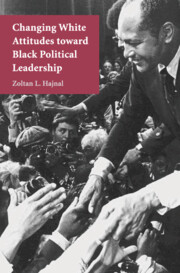Book contents
- Frontmatter
- Contents
- Acknowledgments
- Introduction
- 1 Black Leadership: The Possibilities
- 2 The Transformation of the White Vote
- 3 The Transformation of White Attitudes
- 4 Learning Across Different Cities
- 5 Black Mayoral Leadership in Los Angeles
- 6 Black Mayoral Leadership in Chicago
- 7 Other Cases Where Information Could Matter
- Conclusion: A Tale of Caution and Hope
- Statistical Appendixes
- References
- Index
1 - Black Leadership: The Possibilities
Published online by Cambridge University Press: 23 November 2009
- Frontmatter
- Contents
- Acknowledgments
- Introduction
- 1 Black Leadership: The Possibilities
- 2 The Transformation of the White Vote
- 3 The Transformation of White Attitudes
- 4 Learning Across Different Cities
- 5 Black Mayoral Leadership in Los Angeles
- 6 Black Mayoral Leadership in Chicago
- 7 Other Cases Where Information Could Matter
- Conclusion: A Tale of Caution and Hope
- Statistical Appendixes
- References
- Index
Summary
In a nation that has long been divided by race, the election of black leaders is of great historic importance. But it is in many ways an uncertain step with unknown consequences. Black leadership raises both meaningful possibilities and real risks, especially when African Americans are elected in racially mixed areas. After winning elections, black officials must lead communities that are racially diverse and often bitterly divided. How does white America respond to African American leadership? We have anecdotal evidence from various cases, but we know very little about the general pattern and ultimate consequences of black leadership: We don't know whether minority political leadership tends to exacerbate or reduce racial tension, whether black incumbents are more or less successful than their white counterparts in subsequent elections, or under what political, economic, and racial conditions white support can be maintained or increased over time.
In this chapter, I detail three different accounts of black-white relations that offer predictions about what might happen after the onset of black leadership. I begin by presenting in full my information model of white behavior, which focuses on the information that experience with black incumbents provides white voters. I then contrast this model with two conventional theories drawn from the existing literature on race relations and American politics: the prejudice model and the white backlash model.
- Type
- Chapter
- Information
- Publisher: Cambridge University PressPrint publication year: 2006



